Comparing 'To Lucasta' and 'Dulce et Decorum Est': War Poetry Analysis
VerifiedAdded on 2023/05/30
|6
|1323
|383
Essay
AI Summary
This essay provides a comparative analysis of Richard Lovelace's "To Lucasta, going to the War" and Wilfred Owen's "Dulce et Decorum est," both poems addressing the subject of war but from different perspectives. The essay explores the similarities in their subject matter, focusing on Lovelace's depiction of a soldier's departure for war and Owen's graphic portrayal of the horrors of World War I. It contrasts the poetic devices used by each poet to convey their attitudes towards war, highlighting Lovelace's romanticized view of battle and Owen's stark realism and condemnation of its glorification. The analysis covers the structure, tone, and language of each poem, including Lovelace's use of rhyme and alliteration and Owen's vivid imagery and ironic use of Latin phrases, to reveal their distinct perspectives on the experience and consequences of war.
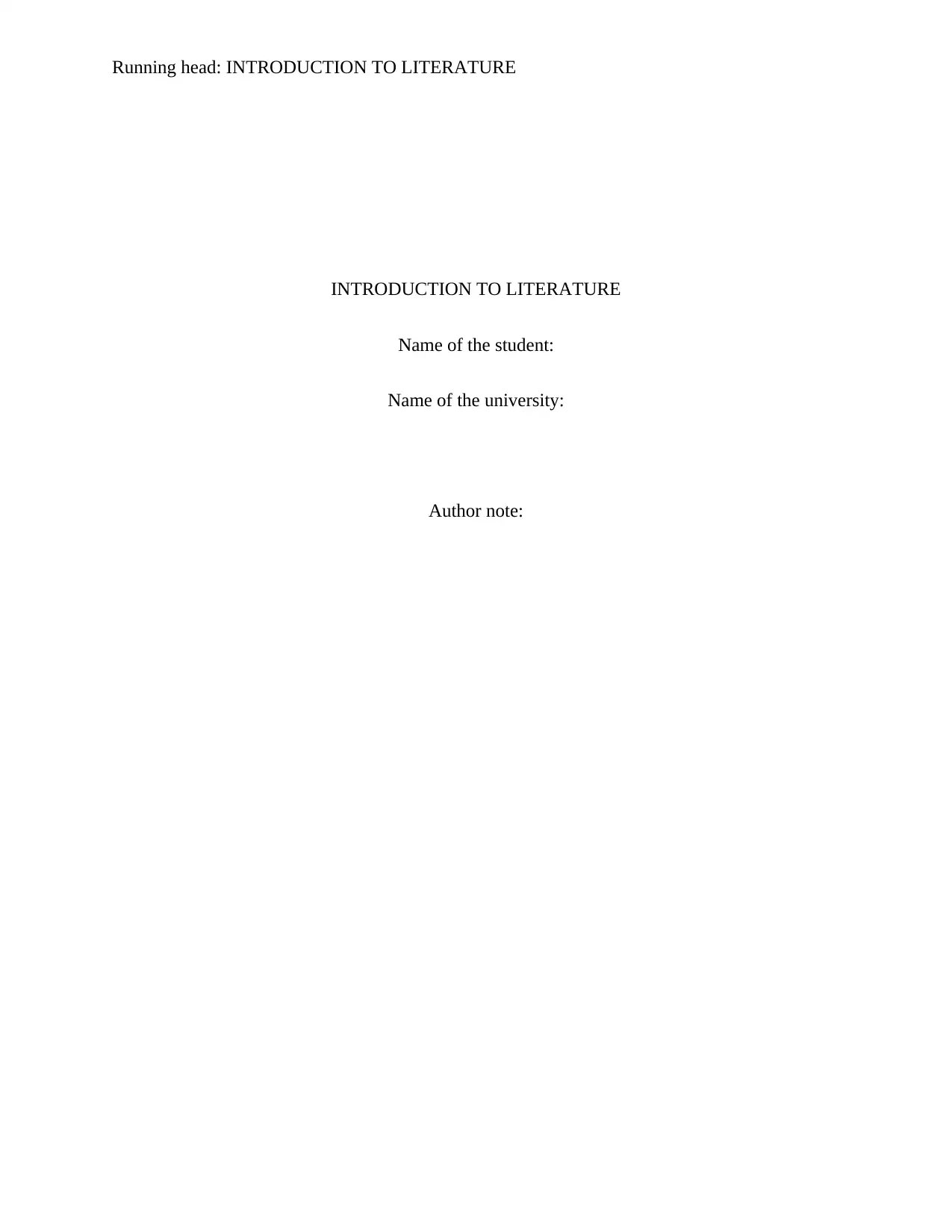
Running head: INTRODUCTION TO LITERATURE
INTRODUCTION TO LITERATURE
Name of the student:
Name of the university:
Author note:
INTRODUCTION TO LITERATURE
Name of the student:
Name of the university:
Author note:
Paraphrase This Document
Need a fresh take? Get an instant paraphrase of this document with our AI Paraphraser
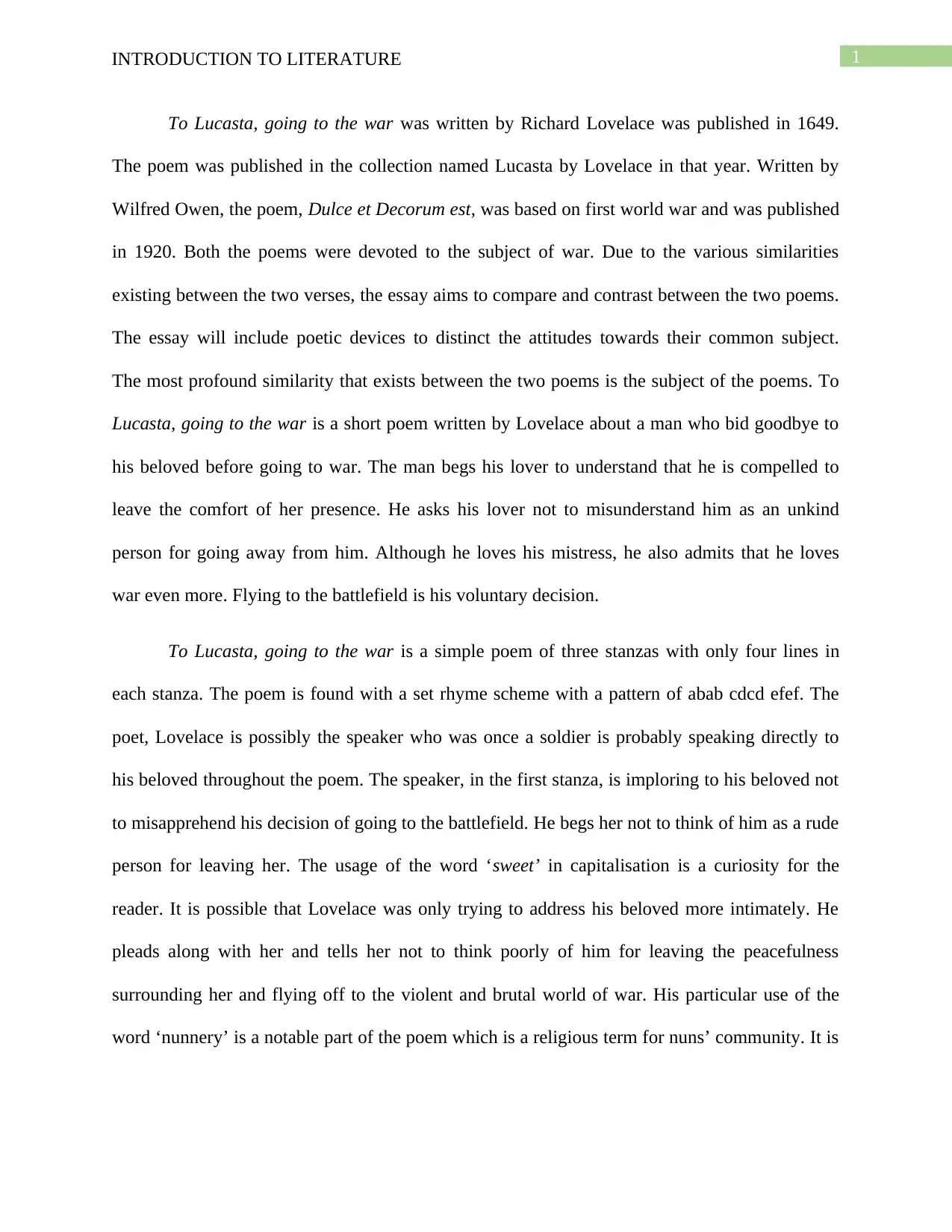
1INTRODUCTION TO LITERATURE
To Lucasta, going to the war was written by Richard Lovelace was published in 1649.
The poem was published in the collection named Lucasta by Lovelace in that year. Written by
Wilfred Owen, the poem, Dulce et Decorum est, was based on first world war and was published
in 1920. Both the poems were devoted to the subject of war. Due to the various similarities
existing between the two verses, the essay aims to compare and contrast between the two poems.
The essay will include poetic devices to distinct the attitudes towards their common subject.
The most profound similarity that exists between the two poems is the subject of the poems. To
Lucasta, going to the war is a short poem written by Lovelace about a man who bid goodbye to
his beloved before going to war. The man begs his lover to understand that he is compelled to
leave the comfort of her presence. He asks his lover not to misunderstand him as an unkind
person for going away from him. Although he loves his mistress, he also admits that he loves
war even more. Flying to the battlefield is his voluntary decision.
To Lucasta, going to the war is a simple poem of three stanzas with only four lines in
each stanza. The poem is found with a set rhyme scheme with a pattern of abab cdcd efef. The
poet, Lovelace is possibly the speaker who was once a soldier is probably speaking directly to
his beloved throughout the poem. The speaker, in the first stanza, is imploring to his beloved not
to misapprehend his decision of going to the battlefield. He begs her not to think of him as a rude
person for leaving her. The usage of the word ‘sweet’ in capitalisation is a curiosity for the
reader. It is possible that Lovelace was only trying to address his beloved more intimately. He
pleads along with her and tells her not to think poorly of him for leaving the peacefulness
surrounding her and flying off to the violent and brutal world of war. His particular use of the
word ‘nunnery’ is a notable part of the poem which is a religious term for nuns’ community. It is
To Lucasta, going to the war was written by Richard Lovelace was published in 1649.
The poem was published in the collection named Lucasta by Lovelace in that year. Written by
Wilfred Owen, the poem, Dulce et Decorum est, was based on first world war and was published
in 1920. Both the poems were devoted to the subject of war. Due to the various similarities
existing between the two verses, the essay aims to compare and contrast between the two poems.
The essay will include poetic devices to distinct the attitudes towards their common subject.
The most profound similarity that exists between the two poems is the subject of the poems. To
Lucasta, going to the war is a short poem written by Lovelace about a man who bid goodbye to
his beloved before going to war. The man begs his lover to understand that he is compelled to
leave the comfort of her presence. He asks his lover not to misunderstand him as an unkind
person for going away from him. Although he loves his mistress, he also admits that he loves
war even more. Flying to the battlefield is his voluntary decision.
To Lucasta, going to the war is a simple poem of three stanzas with only four lines in
each stanza. The poem is found with a set rhyme scheme with a pattern of abab cdcd efef. The
poet, Lovelace is possibly the speaker who was once a soldier is probably speaking directly to
his beloved throughout the poem. The speaker, in the first stanza, is imploring to his beloved not
to misapprehend his decision of going to the battlefield. He begs her not to think of him as a rude
person for leaving her. The usage of the word ‘sweet’ in capitalisation is a curiosity for the
reader. It is possible that Lovelace was only trying to address his beloved more intimately. He
pleads along with her and tells her not to think poorly of him for leaving the peacefulness
surrounding her and flying off to the violent and brutal world of war. His particular use of the
word ‘nunnery’ is a notable part of the poem which is a religious term for nuns’ community. It is
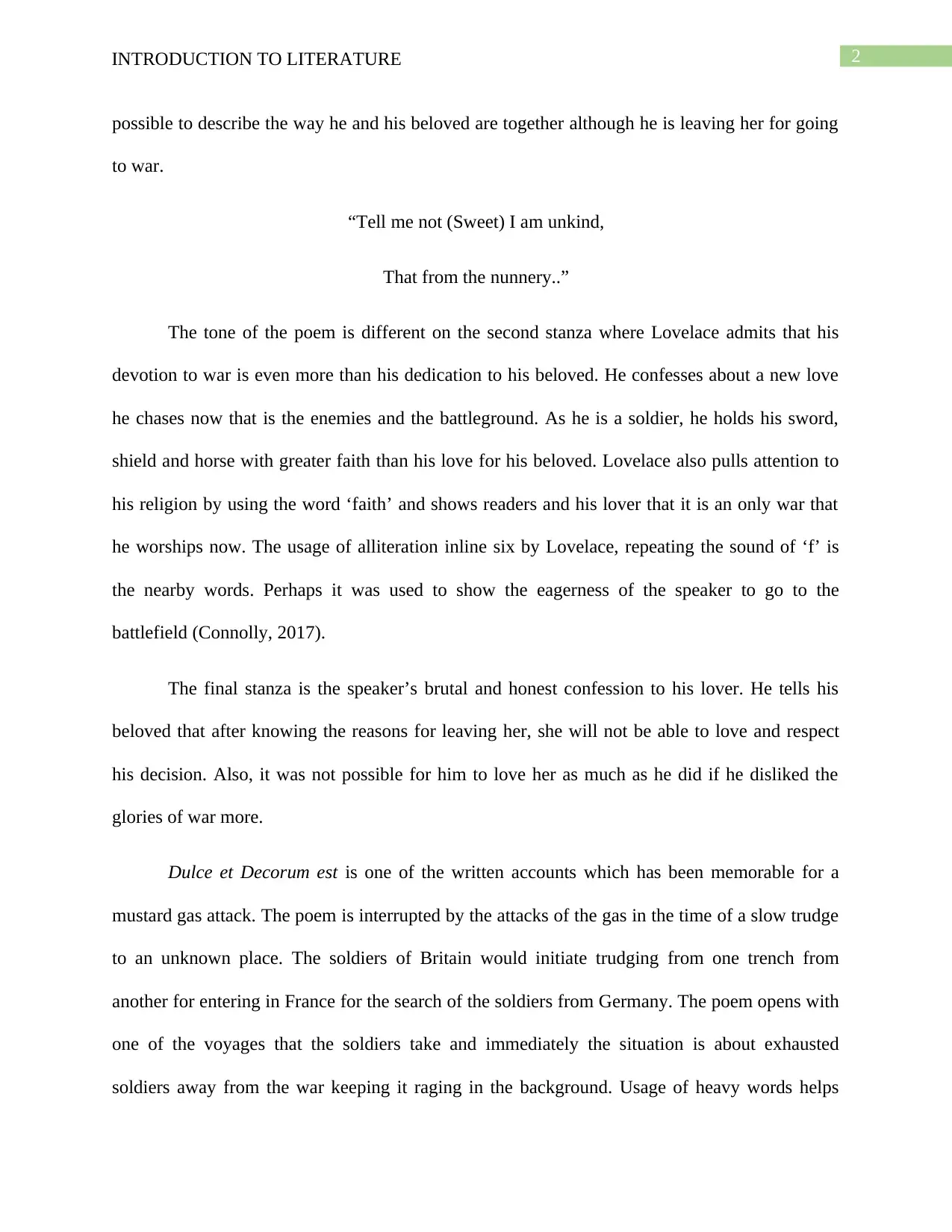
2INTRODUCTION TO LITERATURE
possible to describe the way he and his beloved are together although he is leaving her for going
to war.
“Tell me not (Sweet) I am unkind,
That from the nunnery..”
The tone of the poem is different on the second stanza where Lovelace admits that his
devotion to war is even more than his dedication to his beloved. He confesses about a new love
he chases now that is the enemies and the battleground. As he is a soldier, he holds his sword,
shield and horse with greater faith than his love for his beloved. Lovelace also pulls attention to
his religion by using the word ‘faith’ and shows readers and his lover that it is an only war that
he worships now. The usage of alliteration inline six by Lovelace, repeating the sound of ‘f’ is
the nearby words. Perhaps it was used to show the eagerness of the speaker to go to the
battlefield (Connolly, 2017).
The final stanza is the speaker’s brutal and honest confession to his lover. He tells his
beloved that after knowing the reasons for leaving her, she will not be able to love and respect
his decision. Also, it was not possible for him to love her as much as he did if he disliked the
glories of war more.
Dulce et Decorum est is one of the written accounts which has been memorable for a
mustard gas attack. The poem is interrupted by the attacks of the gas in the time of a slow trudge
to an unknown place. The soldiers of Britain would initiate trudging from one trench from
another for entering in France for the search of the soldiers from Germany. The poem opens with
one of the voyages that the soldiers take and immediately the situation is about exhausted
soldiers away from the war keeping it raging in the background. Usage of heavy words helps
possible to describe the way he and his beloved are together although he is leaving her for going
to war.
“Tell me not (Sweet) I am unkind,
That from the nunnery..”
The tone of the poem is different on the second stanza where Lovelace admits that his
devotion to war is even more than his dedication to his beloved. He confesses about a new love
he chases now that is the enemies and the battleground. As he is a soldier, he holds his sword,
shield and horse with greater faith than his love for his beloved. Lovelace also pulls attention to
his religion by using the word ‘faith’ and shows readers and his lover that it is an only war that
he worships now. The usage of alliteration inline six by Lovelace, repeating the sound of ‘f’ is
the nearby words. Perhaps it was used to show the eagerness of the speaker to go to the
battlefield (Connolly, 2017).
The final stanza is the speaker’s brutal and honest confession to his lover. He tells his
beloved that after knowing the reasons for leaving her, she will not be able to love and respect
his decision. Also, it was not possible for him to love her as much as he did if he disliked the
glories of war more.
Dulce et Decorum est is one of the written accounts which has been memorable for a
mustard gas attack. The poem is interrupted by the attacks of the gas in the time of a slow trudge
to an unknown place. The soldiers of Britain would initiate trudging from one trench from
another for entering in France for the search of the soldiers from Germany. The poem opens with
one of the voyages that the soldiers take and immediately the situation is about exhausted
soldiers away from the war keeping it raging in the background. Usage of heavy words helps
⊘ This is a preview!⊘
Do you want full access?
Subscribe today to unlock all pages.

Trusted by 1+ million students worldwide
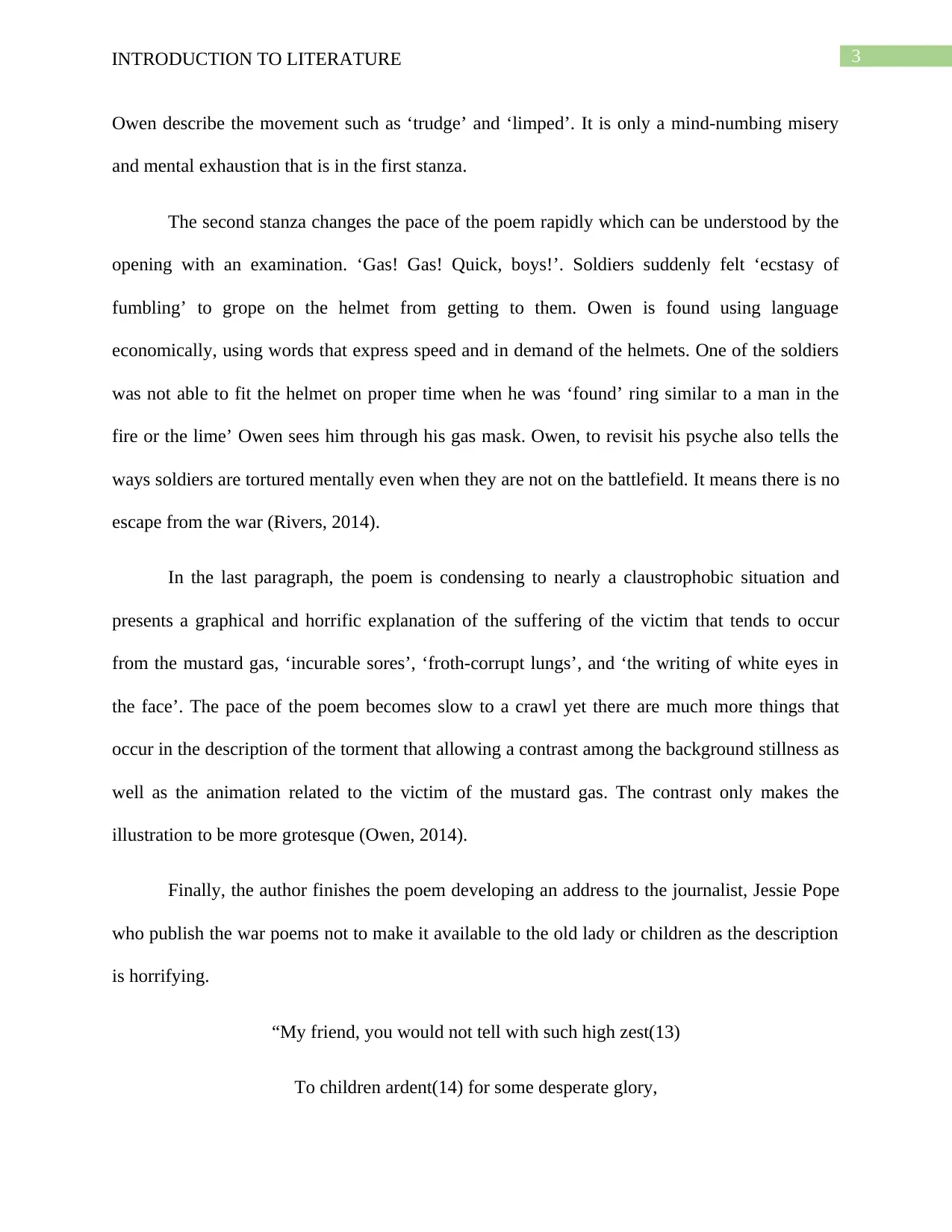
3INTRODUCTION TO LITERATURE
Owen describe the movement such as ‘trudge’ and ‘limped’. It is only a mind-numbing misery
and mental exhaustion that is in the first stanza.
The second stanza changes the pace of the poem rapidly which can be understood by the
opening with an examination. ‘Gas! Gas! Quick, boys!’. Soldiers suddenly felt ‘ecstasy of
fumbling’ to grope on the helmet from getting to them. Owen is found using language
economically, using words that express speed and in demand of the helmets. One of the soldiers
was not able to fit the helmet on proper time when he was ‘found’ ring similar to a man in the
fire or the lime’ Owen sees him through his gas mask. Owen, to revisit his psyche also tells the
ways soldiers are tortured mentally even when they are not on the battlefield. It means there is no
escape from the war (Rivers, 2014).
In the last paragraph, the poem is condensing to nearly a claustrophobic situation and
presents a graphical and horrific explanation of the suffering of the victim that tends to occur
from the mustard gas, ‘incurable sores’, ‘froth-corrupt lungs’, and ‘the writing of white eyes in
the face’. The pace of the poem becomes slow to a crawl yet there are much more things that
occur in the description of the torment that allowing a contrast among the background stillness as
well as the animation related to the victim of the mustard gas. The contrast only makes the
illustration to be more grotesque (Owen, 2014).
Finally, the author finishes the poem developing an address to the journalist, Jessie Pope
who publish the war poems not to make it available to the old lady or children as the description
is horrifying.
“My friend, you would not tell with such high zest(13)
To children ardent(14) for some desperate glory,
Owen describe the movement such as ‘trudge’ and ‘limped’. It is only a mind-numbing misery
and mental exhaustion that is in the first stanza.
The second stanza changes the pace of the poem rapidly which can be understood by the
opening with an examination. ‘Gas! Gas! Quick, boys!’. Soldiers suddenly felt ‘ecstasy of
fumbling’ to grope on the helmet from getting to them. Owen is found using language
economically, using words that express speed and in demand of the helmets. One of the soldiers
was not able to fit the helmet on proper time when he was ‘found’ ring similar to a man in the
fire or the lime’ Owen sees him through his gas mask. Owen, to revisit his psyche also tells the
ways soldiers are tortured mentally even when they are not on the battlefield. It means there is no
escape from the war (Rivers, 2014).
In the last paragraph, the poem is condensing to nearly a claustrophobic situation and
presents a graphical and horrific explanation of the suffering of the victim that tends to occur
from the mustard gas, ‘incurable sores’, ‘froth-corrupt lungs’, and ‘the writing of white eyes in
the face’. The pace of the poem becomes slow to a crawl yet there are much more things that
occur in the description of the torment that allowing a contrast among the background stillness as
well as the animation related to the victim of the mustard gas. The contrast only makes the
illustration to be more grotesque (Owen, 2014).
Finally, the author finishes the poem developing an address to the journalist, Jessie Pope
who publish the war poems not to make it available to the old lady or children as the description
is horrifying.
“My friend, you would not tell with such high zest(13)
To children ardent(14) for some desperate glory,
Paraphrase This Document
Need a fresh take? Get an instant paraphrase of this document with our AI Paraphraser
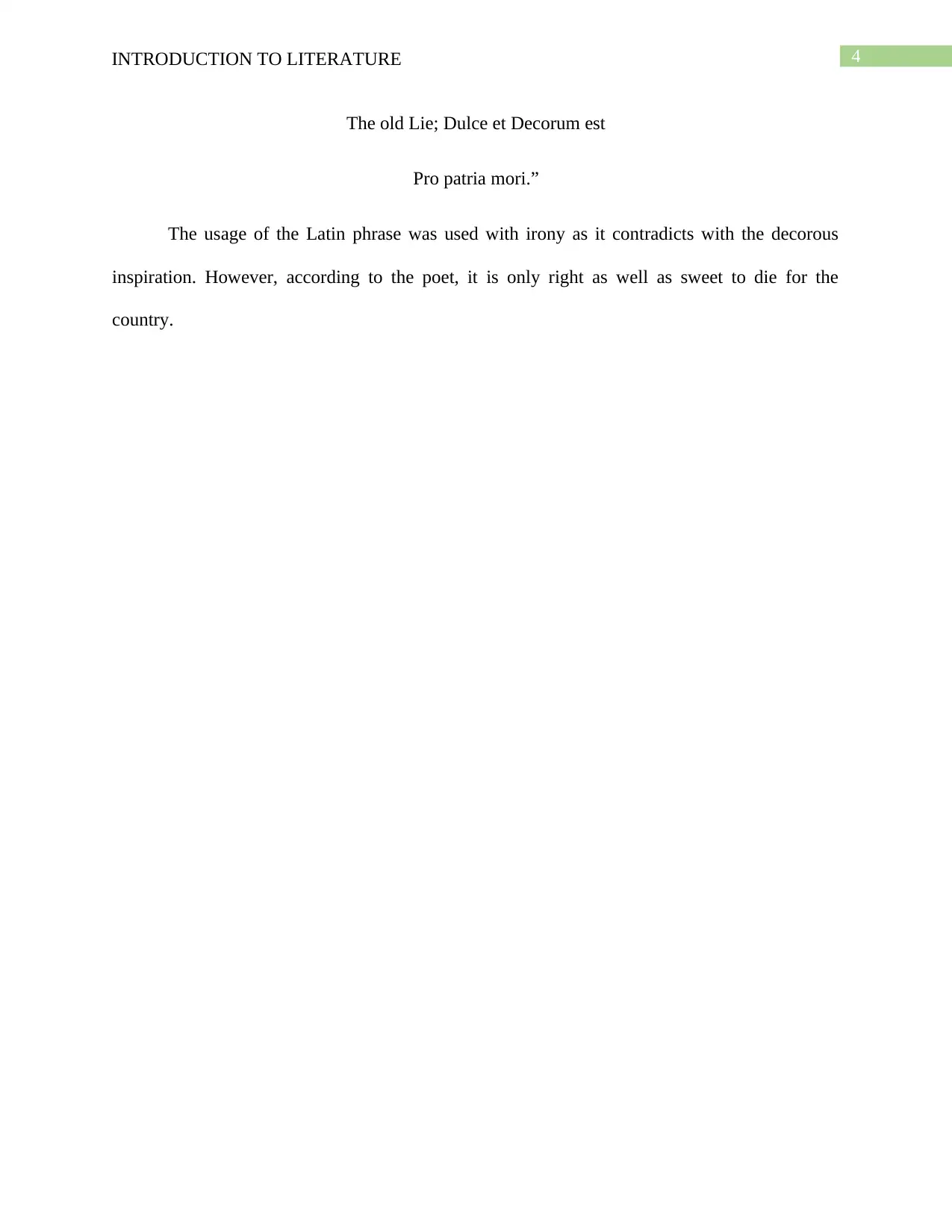
4INTRODUCTION TO LITERATURE
The old Lie; Dulce et Decorum est
Pro patria mori.”
The usage of the Latin phrase was used with irony as it contradicts with the decorous
inspiration. However, according to the poet, it is only right as well as sweet to die for the
country.
The old Lie; Dulce et Decorum est
Pro patria mori.”
The usage of the Latin phrase was used with irony as it contradicts with the decorous
inspiration. However, according to the poet, it is only right as well as sweet to die for the
country.
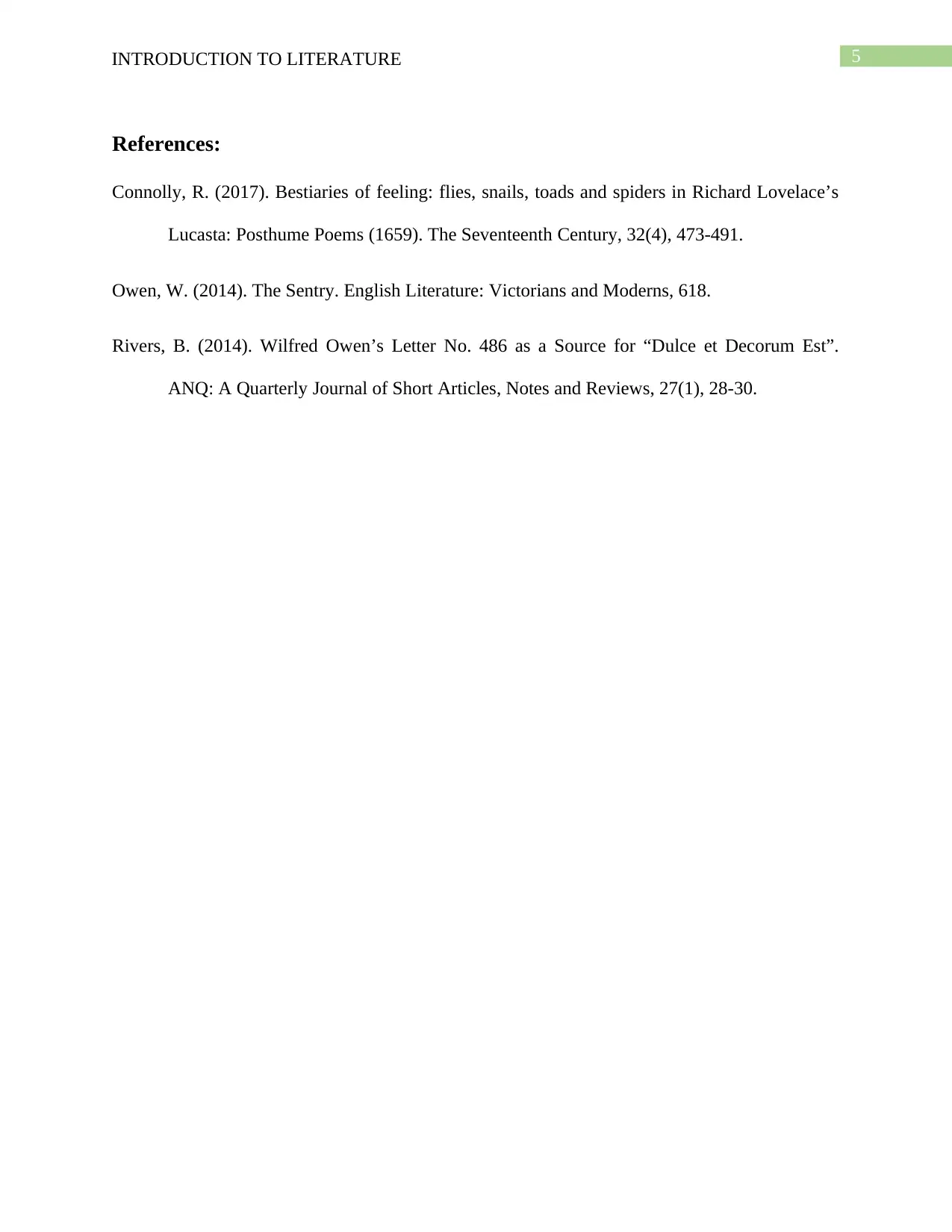
5INTRODUCTION TO LITERATURE
References:
Connolly, R. (2017). Bestiaries of feeling: flies, snails, toads and spiders in Richard Lovelace’s
Lucasta: Posthume Poems (1659). The Seventeenth Century, 32(4), 473-491.
Owen, W. (2014). The Sentry. English Literature: Victorians and Moderns, 618.
Rivers, B. (2014). Wilfred Owen’s Letter No. 486 as a Source for “Dulce et Decorum Est”.
ANQ: A Quarterly Journal of Short Articles, Notes and Reviews, 27(1), 28-30.
References:
Connolly, R. (2017). Bestiaries of feeling: flies, snails, toads and spiders in Richard Lovelace’s
Lucasta: Posthume Poems (1659). The Seventeenth Century, 32(4), 473-491.
Owen, W. (2014). The Sentry. English Literature: Victorians and Moderns, 618.
Rivers, B. (2014). Wilfred Owen’s Letter No. 486 as a Source for “Dulce et Decorum Est”.
ANQ: A Quarterly Journal of Short Articles, Notes and Reviews, 27(1), 28-30.
⊘ This is a preview!⊘
Do you want full access?
Subscribe today to unlock all pages.

Trusted by 1+ million students worldwide
1 out of 6
Your All-in-One AI-Powered Toolkit for Academic Success.
+13062052269
info@desklib.com
Available 24*7 on WhatsApp / Email
![[object Object]](/_next/static/media/star-bottom.7253800d.svg)
Unlock your academic potential
Copyright © 2020–2026 A2Z Services. All Rights Reserved. Developed and managed by ZUCOL.